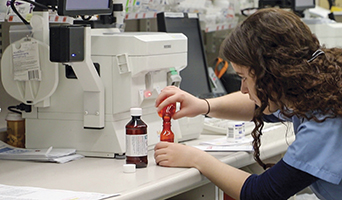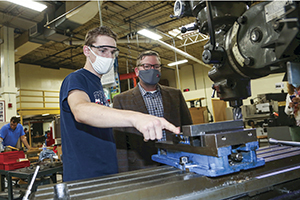.jpg) |
| Township High School District 214 in Arlington Heights, Ill., operates a Center for Career Discovery offering work-based learning experiences, including apprenticeships, in such fields as information technology, health services, engineering and food service. PHOTO COURTESY OF TOWNSHIP HIGH SCHOOL DISTRICT 214 |
I clearly recall the moment I knew beyond any doubt that District 214 in Chicago’s northwest suburbs was on the correct path in blazing a national trail to create work-based learning experiences for all students.
From the beginning, we’ve been confident about the efficacy of work-based learning, or WBL. But I knew for sure once I heard this story. It was 2018, and we had been building these learning experiences for a while, recruiting community members to host these opportunities and carefully aligning them with our coursework and career pathways.
It was deep into the fall semester when I learned that one of our high schoolers had been so excited to learn about aviation career studies offered at Lewis University that he caught a public transit bus at 5:30 a.m., then transferred to another bus and another before finally reaching his destination by 8 a.m.
Mind you, the university campus is only a 45-minute drive from our school district. But because the student relied on public transportation, his trek took 2½ hours starting before dawn. That’s how motivated he was to get a glimpse of an aviation program as he aspired to become a pilot. He toured the campus, sat in on a class, had lunch with his admissions counselor and discussed the aviation programs. In a remarkably classy move, the university gave the student a ride home in a small plane.
While this anecdote involves a university visit rather than a longer-term WBL experience, it nonetheless illustrates the amazing power of getting students out into the community to engage in hands-on learning about prospective careers.
Building Partners
By definition, work-based learning relies heavily on building and nurturing relationships with community partners. District 214’s Center for Career Discovery engages with more than 1,000 industry partners to support WBL and career exploration.
Annually, the center supports more than 3,000 work-based learning experiences. These include apprenticeships, internships, micro-internships and supported worksites, all of which help inform career choices for high school students before they graduate.
Internships and micro-internships vary in time commitments and credits earned, but both provide juniors and seniors with authentic, relevant and meaningful learning experiences designed to assist them in their postsecondary decision making. Apprenticeships, typically pursued by students who have made a definite career choice, are paid workplace experiences and are offered in a variety of fields.
Through these iterations, District 214 helps students make connections and gain invaluable job skills while addressing the employment needs of local businesses and industries.
Schools, in fact, can serve as economic engines when directly engaged in developing the talent pipeline essential to local employers. However, it is challenging to coordinate the resources of the community with students and schools. These partnerships and work-based learning experiences do not create themselves.
 |
| PHOTO COURTESY OF TOWNSHIP HIGH SCHOOL DISTRICT 214 |
Some of the work required to build a partnership network as extensive as District 214’s is mundane yet important. For every prospective work-based learning experience, we conduct an initial site visit and follow-up communication. We do background checks and draw up agreement forms, along with interim and final evaluations. We arrange for student-employer interviews and orientation.
Building and sustaining this kind of network requires an unwavering commitment. District 214 backs its belief in the value of career exploration through work-based learning experiences by asking staff to do the vital work of communicating with our partners by ensuring their needs are met along with those of students and the district.
Focusing on this work for us are a director of academic programs and pathways, a partnership manager, two career discovery super-visors, two student success coaches, 13 job placement specialists, a special educator evaluator/coordinator, a division assistant and an administrative assistant. In addition, an early college program supervisor supports this work as dual credit is a vital component of work-based learning.
A Rumble Competition
District 214 is among the largest high school districts in Illinois, with an enrollment of roughly 12,000 and a staff of 1,600. Because of our size, we admittedly have some resources that are not readily available to every district. The point, however, is not so much the size of the staff available but the importance of prioritizing work-based learning opportunities using whatever staff and community resources a district does have at its disposal.
Together, this team works to ensure that District 214 continuously improves its adherence to the guiding principles behind Career Pathways: first, by building course sequences that lead beyond high school; second, by embedding work-based learning through problem-based learning, industry partnerships and career experiences; and third, by creating opportunities to earn strategic early college credit and/or industry credentials.
This team supports problem-based learning that prepares students for WBL experiences and, in some cases, are as much fun as they are beneficial to learning. One of District 214’s most popular annual events is the Robot Rumble competition, a glorious demolition derby that ends with a championship title for the last robot standing.
To get ready to rumble, students design, prototype and test their ideas over the course of the year. They cut drive and steering parts using computer numerical control. They operate mills and lathes to construct components. They assemble, test and design, bend tubing and weld their robots’ frame. Finally, they program drive systems to allow for remote driving. The engineering, computer programming and manufacturing skills that students take from this competition into a work-based learning experience are invaluable.
The Center for Career Discovery also provides career-related activities such as career nights and career treks, which are facility tours led by industry professionals at their organization, for a group of students and teachers interested in a particular career field. The team arranges site visits, brings industry speakers to our classrooms and creates career exploration presentations to support students’ skill development, decision-making and postsecondary goal setting.
We have hosted Future Ready Showcases, where we demonstrate to the community our students’ learning, innovation and skills in such areas as architectural design, coding and development of apps and mock trials focusing on law and equity. These showcases can be beneficial in attracting community partnerships.
Story Promotion
While many of our industry partners intuitively recognize the benefits they derive from hosting work-based learning experiences, we also explicitly express our appreciation for their role. Each year, the district thanks our community partners by way of a special event.
District 214’s community engagement and outreach team also shares this important story, potentially attracting new industry partners through blogs, web stories and social media. This effort is aided by news coverage at times.

|
| David Schuler (right), superintendent of Illinois’ Township High School District 214, visits a student involved in one of the nearly 1,000 partnerships with businesses leading to apprenticeships, internships and other career exploration opportunities. PHOTO COURTESY OF TOWNSHIP HIGH SCHOOL DISTRICT 214 |
When we unveiled one of the nation’s first high school aviation programs with help from a local partner, we drew coverage from a Chicago TV station. We worked with a local newspaper to highlight a series of our career pathways and the related WBL. Our hope, often realized, is that prospective partners will see or read this kind of coverage and step forward to join us.
Telling the story of our extensive WBL network also leads occasionally to local businesses that see the value of this work to the entire community making donations to the District 214 Education Foundation that further enhance students’ opportunities.
An often less-recognized benefit of our work-based learning experiences is that the partnerships we build help us stay relevant and current in our school-based learning. We value partners’ input. At this time, we are in the midst of updating and refining our Multimedia Communications Career Pathway by working closely with multimedia professionals in our area to ensure our program is addressing the learning and skills that matter most in a fast-changing field.
Actualizing Dreams
Finally, in addition to the aforementioned benefits, District 214 embraces work-based learning so eagerly because, from an equity point of view, we know it can break generational cycles of poverty. How? By building resumes, allowing students to network and develop communication, critical thinking and problem-solving skills so universally valued by employers.
We need all students to dream beyond what they can see and to believe they can do it. Work-based learning builds such self-efficacy. It is our job as school system leaders to plant new dreams in the minds of students.
It is our responsibility to support students’ creation, awareness and actualization of their dreams by providing career guidance and hands-on experience. With a deep commitment to work-based learning, that is exactly what we do.
DAVID SCHULER, the 2018 National Superintendent of the Year, is superintendent of Township High School District 214 in Arlington Heights, Ill. Twitter:
@D214_Supt